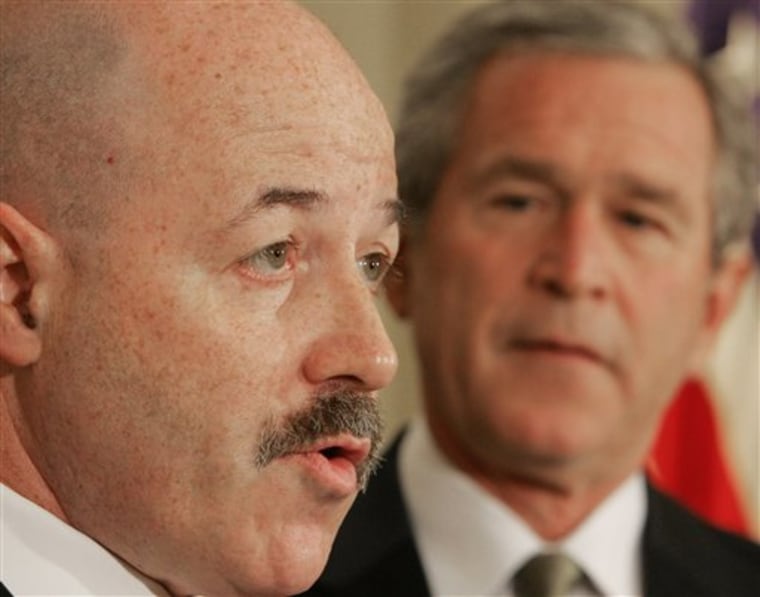Bernard Kerik, President Bush's choice to run the Homeland Security Department, made $6.2 million by exercising stock options he received from a company that sold stun guns to the department — and seeks more business with it.
Taser International was one of many companies that received consulting advice from Kerik after he left his job as New York City police commissioner in 2001, when he was earning $150,500 a year. Kerik remains on Taser's board of directors, although the company and the White House said he planned to sever the relationship.
Partnering with former New York Mayor Rudolph Giuliani and also operating independently, Kerik has had business arrangements with manufacturers of prescription drugs, computer software and bulletproof materials, as well as companies selling nuclear power, telephone service, insurance and security advice for Americans working abroad.
The man who led the New York Police Department on Sept. 11, 2001, has been effusively praised by Senate Republicans and Democrats for his management during and after the attacks. He served the Defense Department in Iraq in 2003 as interior minister under the former U.S. occupation authority.
Federal ethics rules state that executive branch employees should avoid participating in decisions where their impartiality could be questioned, unless they receive approval from an agency ethics official.
Kerik's office said he was not available for comment for this story, but a White House spokesman, Brian Besanceney, said the nominee would avoid any possible conflict of interest.
"Commissioner Kerik is committed to the highest ethical standards and will divest all his holdings in Taser upon Senate confirmation to avoid a conflict of interest," Besanceney said. "In order to avoid even the appearance of a conflict he will comply with all ethics laws and rules to avoid actions that affect former clients or organizations where he served as a director."
Kerik and other former New York City officials joined the ex-mayor in Giuliani Partners, a consulting firm. In 2003, Kerik became chief executive officer of an affiliate consulting company, Giuliani-Kerik. Many of the clients needed security expertise.
Michael Hess, senior managing director of Giuliani Partners, said Kerik will be severed from Giuliani Partners and Giuliani-Kerik shortly. Neither company has federal contracts and neither does lobbying work, said Hess, a New York corporation counsel under Giuliani.
Taser International President Tom Smith, in an interview, said the company has sold Homeland Security between 300 and 500 Taser guns, which fire an electrical charge that disables a person. He said the cost was about $1,000 each, including holsters, batteries and cartridges.
"We're obviously hoping for further expansion," Smith said. "I don't see how it's going to be a conflict because he will be retiring from the board. I'm sure we're going to get questions, but I don't expect we'll get preferential treatment."
Smith said he doubts that competition for future contracts would be possible, since Taser is the only major manufacturer of the stun guns now used by some 6,000 law enforcement agencies.
Taser's chief executive officer, Patrick Smith, said Kerik has been a speaker for Taser at law enforcement conferences, presented checks on behalf of the company to families of fallen police officers and advised Taser on making sales presentations to police chiefs.
According to filings with the Securities and Exchange Commission by the Scottsdale, Ariz., company, Kerik exercised his options and sold stock in November 2003 for $913,500. He made another sale last month for $5.85 million, for a total of $6.76 million, benefiting from a huge increase in the value of Taser stock during the period when he held the options.
The SEC records show that Kerik's price for the options — counting both sales — was $567,838, giving him a profit of $6.2 million.
Kerik, who began on the company board in May 2002, also was compensated at the rate of $5,000 a year for participating in board meetings.
Since May this year, Kerik has served on the board of MedAire, a Tempe, Ariz., company that provides a global medical network for travelers needing assistance and consultations for Americans living abroad who face an immediate security crisis.
Brant Galloway, a spokesman for the company, declined to disclose Kerik's compensation as a director, a consultant and as chairman of the firm's compensation committee, which approves salary adjustments for senior executives.
Kerik has played a key security consultant's role for a number of Kerik and Giuliani clients. Among them:
- Purdue Pharma, the company that makes the narcotic painkiller OxyContin. Kerik helped the company improve security at two manufacturing plants after it experienced employee theft and found that additional security measurers were needed for the highly regulated drug. Kerik worked to improve the capacity of safes to secure the product, upgrade camera surveillance and install other security measures.
- The Pharmaceutical Research and Manufacturers of America, the drug industry association that opposes importation of medicine from Canada and elsewhere. Kerik visited ports, reviewed prescription drug Internet sites and helped prepare a report for the industry on dangers of importation. He told a government task force in April that allowing imports could invite terrorists to purchase drugs legally and use them in a biological attack
- Entergy Nuclear Northeast, operator of five nuclear power plants. Kerik and others helped ensure the plants were operated with state-of-the-art security.
